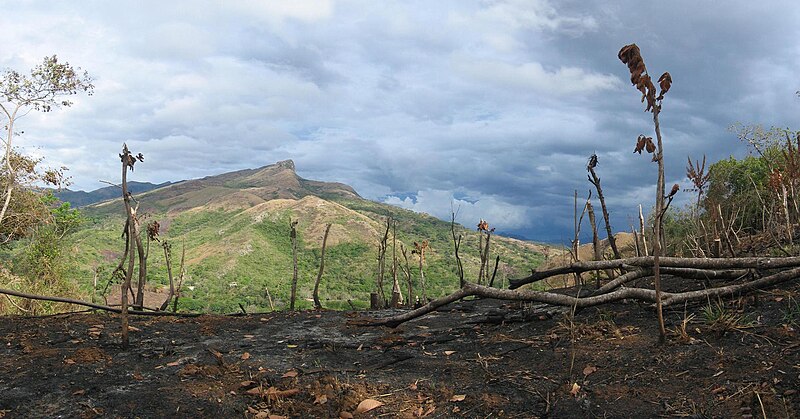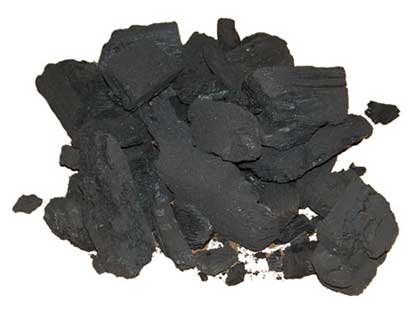--------CROSS-POSTED FROM ENERGY & ENVIRONMENT FORUM----------
In reply to a previous post, I mentioned Amazonian Dark Earths (aka Terra Preta) and some of the benefits of adding charcoal to soil. Some people were interested, some unimpressed, and some scornful. In an effort to pass on what I've learned and to clarify some misconceptions, I'd like to write a short thread on this intriguing but little-understood topic.
FWIW: I am an environmentalist and conservationist, a farmer, a teacher, a Democrat and an ecologist. I am still reading and learning. I am
not an expert by any means.
What is Terra Preta?In the Amazonian basin, lush rainforests are supported by incredibly thin, acidic soil. Low in nutrients and rapidly depleted of its fertility, this soil is poorly suited to support agriculture. Still, every year vast amounts of forest are clear-cut, burned, and planted to crops. After a few years, the soil is exhausted and the farmer moves on. This is the result:

Yet there are small areas of the Amazon which have deep, rich soil, almost black with so much organic matter. These ultra-fertile areas have been continuously cropped for decades (centuries in some cases) with few to no inputs; they are virtually self-sustaining. This is
terra preta, "dark soil" in Portugese.

 Where did it come from?
Where did it come from? These soils have been recognized by natives for centuries yet scientists are just now identifying their origin. According to research (too detailed to get into here),
these black soils were created by the steady addition of charcoal to tropical soils by Amerindians. Though the Indians have all but vanished and the processes halted, the soils remain to this day, utilized extensively for mango and papya production.
What is charcoal?

Charcoal is wood which is burned without oxygen. Volatile gasses and oils are liberated and carbon is left behind. The resulting product is lightweight and extremely porous.
How does it help the soil?Charcoal is composed almost entirely of activated carbon, the same material used in aquarium filters, water purifiers (and vodka distilleries! :toast: ) Without getting into too much detail, activated carbon is very good at grabbing loose ions and holding onto them tightly. So if buried in soil, charcoal latches onto loose nutrients (calcium, magnesium, potassium, phosphorous, nitrates and nitrates) and prevents them from leaching out of the soil. The more charcoal you add, the more food is held
in situ for the plants to utilize. Due to the high surface-area:volume ratio, charcoal can adsorb HUGE amounts of soluble nutrients relative to its size. It functions like a sponge, soaking up nutrients and saving them for plants and microbes.

Since carbon in this form is very stable, the charcoal breaks down VERY slowly (over centuries), a very useful ability considering other organic matter breaks down rapidly in the hot, wet tropical soils. Another benefit charcoal increases tilth, which makes the soil fluffier and allows for better water retention. During a heavy rain less water runs off, and during a drought more is water available.
What other benefits come from burying charcoal?OK, so we can see how putting this stuff into the soil makes it more fertile and more stable. It grows better plants, prevents runoff, and retains moisture. What else?
Charcoal is carbon. During its creation, up to 50% of the carbon found in the woody tissue is lost as CO2. The other half is buried and remains in the soil for many years. Sequestered if you will
So if a tree has a few hundred pounds of carbon (all taken out of the air), half of that will go into the soil for a looooong time. Not only do we sequester this greenhouse gas, but we also increase the soil fertility. Sounds good so far, right?
Other current research has shown that charcoal prevents NOx and methane losses upwards of 80%. These are far more potent greenhouse gasses then CO2 and as permafrost melts, they will flood the atmosphere.
What other benefits does charcoal creation offer?Improved soil and carbon sequestration - These two benefits alone would more than justify a second-look into charcoal. But wait, theres more! Several companies (
EPRIDA,
BEST) have created processes (Pyrolysis) that create charcoal with biodiesel and hydrogen as the byproducts! Well Alec, thats great, but were still burning fuel and adding hydrocarbons to the atmosphere... Actually
it is still a net-carbon-negative process, even taking into account the eventual burning of the diesel! So we have:
1) reduced environmental degredation (less slash-and burn)
2) increased soil fertility
3) sequestered carbon AND
4) fuel.

There are countless other benefits that are hard to quantify - more jobs (this is labor intensive), more wildlife and biodiversity, less dependence on foreign energy, more clean water, the list goes on and on. Whats not to like!? I dont believe this is a magic bullet to solve all our problems. I DO believe it is a promising avenue, and one we should explore further.
Here are some links for further study:
WikipediaArticle on Cornell Prof. Johannes Lehmann's researchArticle in Nature MagazineTerra Preta Discussion ForumGREAT website (lots of resources)
EPRIDA BEST)

I hope this helped :hi:
-Alec